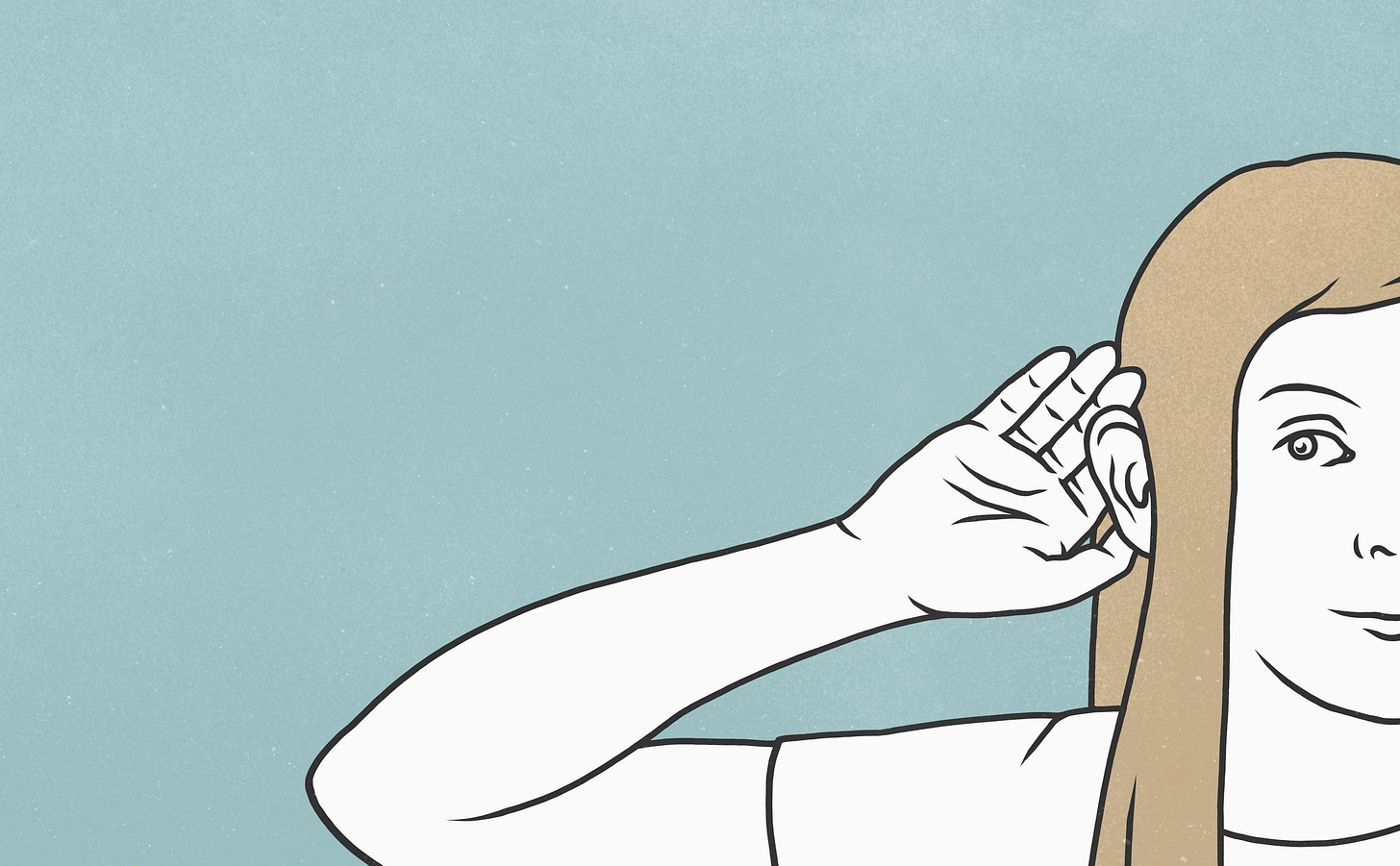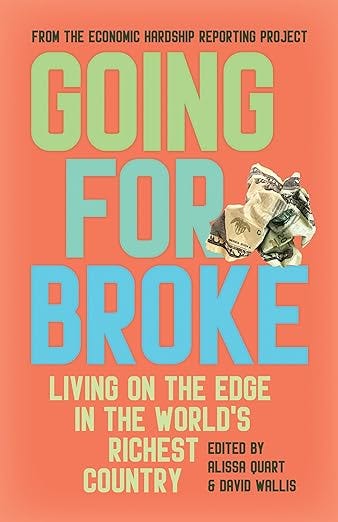You Talk Real Good
Alison Stine confronts the ways in which being hard of hearing has made her job search more difficult.
Disability status?
It’s a question I am confronted with almost daily when I fill out job applications. Sometimes I skip the question or I say I am not disabled. Sometimes I answer it truthfully, writing that I am hard of hearing (HOH), born partially deaf.
I was laid off eight months ago from my full-time editing job, and in the arduous process of searching and applying for positions, I often face this voluntary disclosure form asking what I am and what my body does and does not do. Disability isn’t always included as one of the options on disclosure forms; it doesn’t always count as part of diversity.
But my status has bearing on my job search. Less than 40% of people with a hearing loss have fulltime employment, according to a study cited by NPR, in an article which profiles a woman very much like me, with hearing loss and multiple graduate degrees, who’s applied to over 1,000 jobs with no offers.
I’ve only applied to over 60, as of this writing. But I haven’t got any job offers yet.
***
Some who are d/Deaf would not consider me disabled, but instead, champion the identity as part of a distinct minority group. But perhaps because I was born into a family that was entirely hearing, I was raised to believe my difference was something to hide, not celebrate, a legacy of shame I am still unlearning. Deaf with a big “D” stands for the Deaf community, deaf with the little “d” stands for the physical condition of being deaf — I was so distant from Deaf culture, I didn’t know this distinction until I was in my 30s.
I was born with less than 50% hearing due to a congenital issue. ‘A fluke,’ my mother told me her doctor said.
I didn’t meet another hearing impaired person, or at least one who disclosed to me, until I was in high school. The reality is, I don’t know what I am. Hard of hearing is perhaps a medically correct term, but for many people, it incorrectly conjures up the image of someone who is old and infirm. Am I disabled or not? Do I count or am I counted out?
According to the National Institute on Deafness and Other Communication Disorders (NIDCD), around 2 to 3 out of every 1,000 children in the United States are born with some hearing loss. Over 90% percent of us are born to hearing parents, as I was. It’s often an invisible difference, unnoticed by the larger, abled world.
I was born with less than 50% hearing due to a congenital issue. “A fluke,” my mother told me her doctor said. I suspect, like most people as they age, I am losing more hearing, but have not been tested in years. I’m afraid to be. The last time I saw an Ear, Nose, and Throat Specialist, he wanted to “play a trick” on his medical student, to see how long it would take her to discover my hearing loss and what her reaction would be. He thought it was great fun, and was surprised when I didn’t laugh. Pro tip: You can’t be in on the joke if the joke is about your own body.
His joke, of course, was that most people assume everyone they meet is abled. Impairment, even to a med student, apparently, is a rude surprise.
I pass as hearing. I don’t wear hearing aids, but even if I did, they would be hidden by my hair. I’m a younger, “healthy-looking” person — not the image that is conjured up when most people think of the hard of hearing. But after someone speaks, depending on how close they are to me, how loud or low or clear their voice, I have to quickly arrange the words in my head to figure out which ones logically are missing. I read lips. I’m able to make sense of a lot. But the rest is up to me. I’m a code breaker for daily living, a task I do constantly and with no support.
Because I pass, I am part of no group, without a clear identity or sense of belonging.
***
It doesn’t always serve me to disclose. According to the National Deaf Center, a significant gap exists between employment among deaf and hearing people: only 48% of deaf people were employed in 2014, while 72% of hearing people were. The National Deaf Center makes clear, however, that this number may be so high in part because some deaf people may have given up looking for work. The Communication Service for the Deaf reports 9.6% of people specifically with a hearing loss are actively searching for employment but not finding it, like me.
Generally, people with disabilities are less likely to obtain higher degrees, and more likely to work part-time, according to the Bureau of Labor Statistics. Their salaries are much, much lower, too, as little as the shockingly low 22 cents an hour. Is it any wonder that almost 27 percent of people with disabilities live below the poverty line, according to the US Census Bureau?
“You can’t tell at all,” is the thing I am told most often when I do mention my hearing loss, followed by, “But you’re a writer! You’re gifted with language,” revealing a lack of understanding that d/Deaf and hard of hearing people juggle and interact with, fight and tame language more than any hearing person ever will. “You’re so smart,” is another popular, incredibly ignorant response, as if the physical process of hearing is connected to intelligence (it is not).
And my personal favorite comment about my hearing loss, which came, of course, from a hearing person: “But you talk real good!”
When I do disclose my difference, I try to make it casual. I start with “It’s not a big deal …” Still I watch abled people’s faces fall, time and again. A disabled or different person has entered their space — interrupted their life of not paying attention, not considering, or maybe not even caring — and suddenly everything has been upended. They feel bad for me; they feel bad about themselves, that they have it so easy, that they haven’t had to think with each spoken interaction.
And weirdly, they feel bad that they don’t know, somehow. Is it guilt, or a sense of alarm that they hadn’t found me out?
I wonder if part of the aggression behind these remarks springs from abled people feeling betrayed by my identity — that they hadn’t been able to guess about me, that I snuck in. If I, a person who is hard of hearing, publishes as a writer, has advanced degrees, and interacts with the hearing world so seemingly easily, who else in their space might be disabled, unbeknownst to them?
The answer, of course, is many people. According to the Centers for Disease Control and Prevention (CDC), 61 million Americans have a disability.
More women have disabilities than men. The unemployment rate for women with a disability was 11% in 2016, higher than the unemployment rate for men with a disability, and higher than the unemployment rate overall, as reported by the Bureau of Labor Statistics. Unemployment is even worse for women of color with disabilities.
Advocates have been trying to draw attention to the high rates of unemployment among people with disabilities on Equal Pay Day, the day of the year (it varies year to year) when the pay of white women (and only white women — women of color make still less) allegedly “catches up” with men’s pay. But even a video on the disability pay gap from the Equality and Human Rights Commission, which lists statistics for “types of impairments” — including learning disabilities, impairments of legs or hands, and seeing difficulties — and their corresponding pay gaps, doesn’t mention deafness or hearing impairments at all. Am I that invisible?
I know that, to many people, I am lacking: “You miss so much,” a hearing man, a music major, said to me in college.
I know that when people find out about my hearing loss, they respond with several emotions, like that man did: disbelief, sorrow, guilt. They feel bad for me. So do some people in the Deaf community. “You’re not a part of any world,” a sign language interpreter once told me.
And that remark does feel true. I hear some spoken language, but not all. I know some American Sign Language (ASL), but not enough to be fluent; I’ve never had anyone in my life to sign to.
Hearing people also tend to feel bad that they didn’t know about my difference. But how could they know? I pass, both by accident and on purpose.
Growing up, it was easier to just pretend I got everything — and for the most part, I did. I nodded at boys. I said yeah a lot. How was this different from any number of (hearing) girls, how we were all expected to be: silent, supportive, watching on the sidelines, our fingers curled around chain link fences while the boys played sports, our hips glued to the arms of couches while the boys played video games?
I blended in by falling back. My hearing loss was misinterpreted as just being shy, just being young. Just another girl who hid her body in sweatshirts and long hair; who hid her deafness in smiles.
No one worried about my job prospects because I was so “bright” and driven. No one told me that it might not matter how hard I worked. No one warned me about the unemployment rates among people with disabilities and impairments, maybe because I had no one d/Deaf in my life to tell me about their lived experiences.
When it came to daily interactions with hearing, orally speaking people, I wasn’t given a key; I had to invent it. And I wasn’t given a prize for figuring it out in record time, for responding appropriately, and for not letting on that I was different. Since I was a child, I’ve had a headache almost every day. It took another ASL interpreter to help me make sense of that. “It’s from listening so hard,” she said. I was concentrating so intently on interactions with hearing people, I caused myself physical pain. I’m not the only hearing impaired person to report daily headaches.
Hearing people tend to feel bad that they didn’t know about my difference. But how could they know? I pass, both by accident and on purpose.
It took insightful friends and lovers to realize: You didn’t hear what I said, did you? To speak up even when I couldn’t or didn’t know to. Having a hearing loss has forced me to be loud, to speak up for what I need and am legally supposed to have, to speak up again when I am not believed or taken seriously the first time. Or the second time, which happens often.
It’s really not a lot I need: to sit with my more profoundly deaf side against the wall so that I can hear those in the room better; to not teach or give a lecture, as I have been forced to do multiple times, right next to a loud fan or bleating air conditioner.
But the very nature of my difference is quiet.
I am so used to being dismissed, it never occurred me until recently, as I apply for job after job and receive no offers, that my hearing loss might be part of it.
Maybe there is something off about me, impacting my job prospects. You can’t put your finger on it, but it’s enough to mark me as other.
Dr. Brenda Jo Brueggemann, a Deaf and Disability Studies scholar, once wrote that people thought her “accent,” from her hearing loss, was German. One of my ASL teachers said there was a slight distinction to my voice, but it was minor; you had to be trained in hearing issues to understand what it might mean. She said she wouldn’t have assumed about my hearing loss, even as a specialist, if I hadn’t disclosed it.
***
It’s a funny mantle to wear: difference, but difference no one really knows about unless you tell them. And then they may not trust you about your lived experience, anyway.
It’s why I spent hours working up my courage to ask a friend how I could join the disability caucus of an organization for writers we both belong to. Because if people can’t see inside my head, if they can’t hear what I hear or know what I miss, how I fear rejection even among those with whom I am supposed to share an affinity, how will they know I’m different? How will they believe me?
I don’t have it that bad, I always tell others — and myself. I was born like this. I’ve never known more sound. I’ve never missed it. And I think I’m doing OK. But I know it might be holding me back professionally — and financially.
We need to have more discussions about disability and deafness, what limits us and what doesn’t limit us. I can do absolutely everything that a hearing professor, a hearing writer, a hearing editor, a hearing person can do, except hear you clearly if you whisper on my side, or if we’re in a loud bar at a crowded table — and frankly, that’s not in the job descriptions for those professions. Most hearing people have a hard time in those situations too.
Still, there are things people make jokes about in public spaces without shame. Deafness is one. It’s also, despite being mocked, something that everyone makes claim to. I’m a little deaf haha joked a woman at a conference recently where I was speaking. When it was my time to lecture, I disclosed that I am partially deaf and asked if anyone needed the handout I had printed of my remarks for accessibility reasons.
Weirdly, no one was a “little deaf” then.
Everyone is a little deaf until I speak up that I need accommodation, as required by law, and suddenly, nobody is. And nobody knows what to do about me either.
The answer is nothing. You really have to do nothing. And as my hearing boyfriend said to me recently, “It’s not your job to make sure you hear me. It’s my job to make sure I speak clearly. And I should be doing that work all the time, for everyone.”
As I’m applying for jobs, I pause on the disclosure form. I want to tell future colleagues and employers that they should just give me a chance. You don’t have to treat me differently, I want to say. You don’t have to guess. You don’t have to dismiss me outright. The only thing you have to do is listen to me tell you what I need. You simply have to listen: the very thing you’ve been expecting me — and many people like me — to do my whole life.








Thank you for adding to our body of collective knowledge about this experience.
Such an important insight and, beautifully written. I wish I could offer you a job!